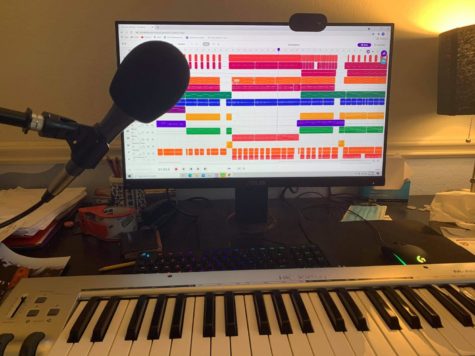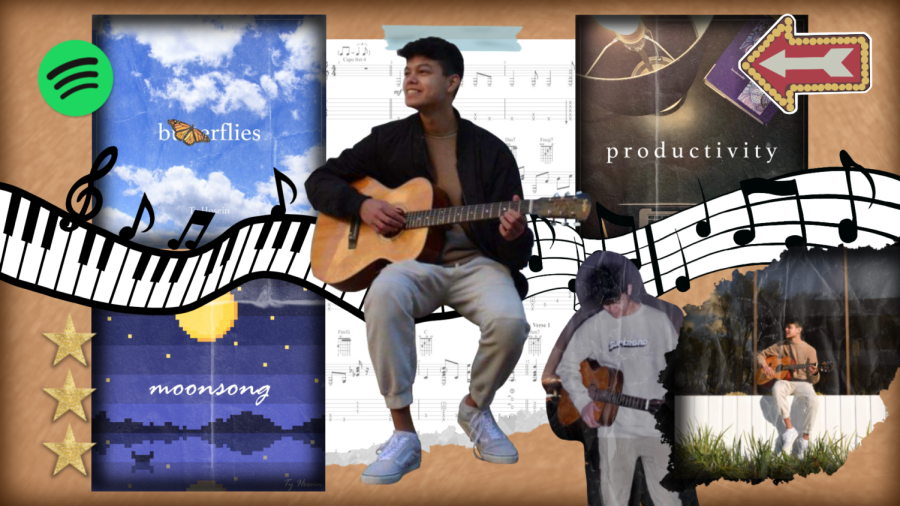Ty Hosein finds a new groove
Graphic illustration by Crystal Qian
A gifted multi-instrumentalist, Junior Ty Hosein has recently channeled his musical talent into songwriting.
April 21, 2021
Junior Ty Hosein gently sways along with the melody as his dancing fingers glide across the keyboard in a fantastic, dizzying blur. The crescendo roars, and he hits the final beautiful note, permeating the room with mingled ecstasy.
From tapping piano keys at 3 years old to brainstorming lyrics in the dead of night, Hosein has embraced a deep and tenacious relationship with music. Recently, he has expanded his musical prowess to include songwriting as well, releasing singles “productivity,” “butterflies,” “moonsong” and “moonsong – Instrumental” beginning in February. Having accumulated more than 100 monthly listeners on Spotify, Hosein’s “productivity” and “butterflies” have tallied 1,765 and 1,109 streams, respectively.
“Music has just become an outlet for me to express myself,” Hosein said. “It’s given me more confidence. I’ve always liked music, but I’ve never really considered actually making it until now — and now I’m having fun doing it.”
Like many other students, Hosein was forced into taking piano lessons when he was young, which began his initial foray into the vast world of music. At just 3 years old, Hosein began picking up music theory and grasping physical skills such as coordination, dexterity and finger independence. Although he disliked playing the classical piano and eventually quit in ninth grade, his 10 years of piano experience have been instrumental in and shaping his musical knowledge and ability.
Hosein discovered an interest for music creation in elementary school, dabbling with GarageBand to create arrangements of songs on the radio — a pivotal stepping stone in his broader musical journey. In high school, Hosein furthered his passion for music by joining Lynbrook’s marching band as a drummer. In October 2020, in part motivated by the isolation of the pandemic, he picked up yet another instrument: guitar. When self-learning the basic techniques and fingerings, he found the learning curve to be much flatter because he had already developed strong music fundamentals.
Drawing inspiration from his surroundings and his spontaneous thoughts, Hosein primarily focuses on writing bedroom pop, a curious music genre characterized by lo-fi quality and contemplative lyrics.
“I’ve always liked poetry, and I kind of just wanted to write songs,” Hosein said. “One day, I was just like, ‘Wouldn’t it be cool if I wrote a song or something?’ It was 3 a.m., I was in bed, I couldn’t sleep and it was a weekday, so I just wrote a song about how I do nothing.”
In representing these feelings, he compiled his first song, “productivity,” which hyperbolizes his chronic discontent with his unproductivity.
Hosein’s favorite composition, however, is “moonsong,” his latest piece where he tinkers with ideas of the sky and the more abstract beauties of life. Although he says that “moonsong” may not be his best song musically or lyrically, he believes that his improved ability to produce has technically distinguished “moonsong” among the rest.
“In the beginning, I just felt unprofessional because I didn’t know what I was doing,” Hosein said. “Overcoming it was finding the right tools — things like finding out how to mix, what patches sound good and what microphone to use. I feel like with every song that I made, I learned more and more and developed new techniques.”

Taking anywhere from a couple of weeks to a month, the production process of Hosein’s songs begins with the development of lyrics, chords, the main melody and the central chorus. Interestingly, many of his ideas are conceived from the comfort of his bed in pensive darkness — typically at around 3 a.m.
“Theoretically, if I were to focus on it, it would probably take a couple of days, but since I procrastinate and I have a bunch of other stuff to do, it takes more time,” Hosein said. “3 a.m. is the only time I ever want to write songs because it’s at the end of a long day.”
During the next couple of days in this process, Hosein shares an acoustic version of his budding song with his friends on Discord. He hopes to draw some constructive criticism to shed light on his opportunities for improvement, which is an integral part of his songwriting process.
Hosein uses Soundtrap, Spotify’s music production program, to develop his vocals and instrument tracks. He first compiles a background track, a rhythmic accompaniment that consists of recordings of synthesized instruments including the guitar, piano and drums. After developing these building blocks, he records vocals and does vocal mixing, which is the process of blending together recorded soundtracks. Lastly, he adds final touches and collaborates with his friends to design an eye-catching album cover.
“The most challenging part is getting all the vocals the way that I want them because my voice is not as good as I want it to be, and I have to re-record a lot,” Hosein said. “Sometimes I record so much that I lose my voice, and I have to wait until the next day to record again because I keep singing a little flat or a little sharp.”
Indeed, Hosein hopes to improve his singing voice, lyrical point of view and the complexity of his arrangements. Currently, he is applying these refinements in his ongoing composition, “Time Machine,” whose projected release date is in early May. Starting from summer 2021, he hopes to release a large collection of music ranging from singles to albums.
Like many musicians, Hosein harbors ambitious dreams of building a large platform and becoming a roaring success. Although he finds careers in the music industry to be enticing, he is cognizant of its unpropitious financial reality; as such, he is looking forward to continuing pursuing music as a hobby.
For aspiring songwriters, Hosein highlights the importance of being open to criticism, considering outside opinions and maintaining an empowering mindset.
“I feel like a lot of people could make music if they knew how,” Hosein said. “Everyone has an outlet that they like to express themselves in. Making music is not a one-person process. And don’t feel bad if your song doesn’t sound amazing on the first try because it takes a long time.”





























































Jack Sparks • Apr 22, 2021 at 10:10 am
Outstanding!